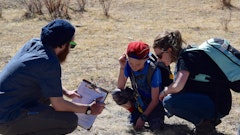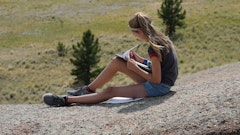The Three Questions
When is the best time to do things? Who is the most important one? What is the right thing to do?
The coronavirus has all of us on edge: we want to do the right thing, for the right people, at the right time. It reminds me of a book I read last week at my son’s elementary school as part of the annual Dr. Seuss and Friends storybook reading day. The Three Questions, by Jon J. Muth is a tribute to Leo Tolstoy’s story by the same name, with slightly different characters puzzling over the same three questions:
- When is the best time to do things?
- Who is the most important one?
- What is the right thing to do?
The complex landscapes of social media, differing socio-political and medical opinions, and a never-ending news cycle makes the world feel like it is both inploding and exploding at the same time. It feels out of control and uncertain, yet it also feels full of possibility, solidarity and new-found direction. It is also a really, really, really interesting time for our children and it is imperative that we provide them with a confident foundation as supportive adults.
The Muth story is told through the experience of a boy, Nicholai (Muth’s son’s name and Tolstoy’s brother’s name). He is seeking answers to his three questions and discovers that by helping a wise turtle (Leo) plant his garden, he invests his time in a way that is benefical to Leo, to the earth and to himself. Because of the time spent in the garden, Nicholai is nearby when he hears a panda’s cries for help during an afternoon storm. Unlike the old turtle, Nicholai is young and able to help carry the panda and her lost child to safety, putting himself in harm’s way to help the two creatures find each other and survive the storm.
The coronavirus is metaphoric in so many ways: it is an enemy, a unifier, a distiller, an unknown, a terror, an opportunity, a risk, a challenge. And it is only through challenge that we grow and learn and stretch our individual and collective capacity. It is how we can evolve and create resilient and even more connected communities. Learning to overcome obstacles is one of the very lessons we hope to teach our campers and children in order to make them stronger, wiser and even better problem solvers.
Yet how can we do that at a time like this?
If we keep ourselves and our minds in the immediate spaces around us: our families, our friends, our colleagues–we, like Nicholai and Tolstoy’s king, see that the most important ones are the ones we are with right now.
We know that the right thing to do is put their needs ahead of our own–whether that be working from home to maintain the health of our older colleagues; washing our hands before and after we head to the grocery store; supporting the leadership of school superintendents and administrators as they make remarkably hard decisions; or just taking time to be present with our children, grandchildren or other people’s children who are trying to make sense of it all.
As our community, organizational, workplace and school leaders make decisions for the Greater Good, recognize that your actions and presence are actually what make those decisions worthwhile. Can you offer to help teach a class online during a school closure? Can you make a donation to your favorite local theater/performance space that has been closed? Can you buy some gift cards to local restaurants to use as gifts later in the year? Can you respond, with agility and flexibility, when situations change and we find ourselves in uncharted territory?




Sanborn and COEC operate from a “servant leadership” philosophy–Sandy and Laura promoted the “See-Do” mentality: if you see something that needs to be done, then just do it. It may seem like a million things need to be done right now, but if we focus on the needs of those immediately around us–we will be doing the right things.
So take 20 minutes to read to your child, or to yourself, from a real book–not a screen–today. Make yourself, and your partner or spouse, a cup of coffee or tea. Go outside, close your eyes and take ten deep, long breaths. Take fifteen minutes from the 3rd Zoom meeting you have had today and have everyone on your work team take turns sharing their screen and their funniest YouTube clip. Call or email the local school principal and tell them what 10-20 minute lesson you could teach online–maybe it’s literary analysis or maybe it’s how to do a load of laundry.
See what is possible in the moment with the people closest to you.
“This is why we are here.” -Leo Tolstoy-
“This is why we are here.” -Leo Tolstoy-
